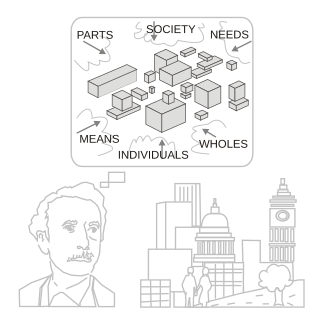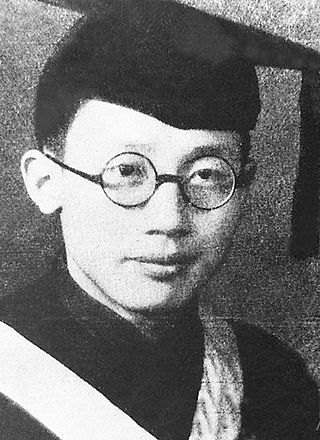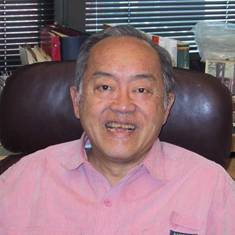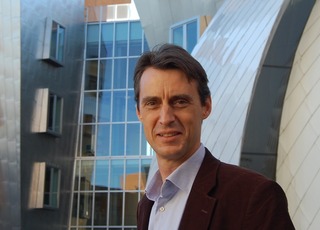Related Research Articles

Control engineering or control systems engineering is an engineering discipline that deals with control systems, applying control theory to design equipment and systems with desired behaviors in control environments. The discipline of controls overlaps and is usually taught along with electrical engineering and mechanical engineering at many institutions around the world.

Electrical engineering is an engineering discipline concerned with the study, design, and application of equipment, devices, and systems which use electricity, electronics, and electromagnetism. It emerged as an identifiable occupation in the latter half of the 19th century after commercialization of the electric telegraph, the telephone, and electrical power generation, distribution, and use.

John Bardeen was an American physicist and engineer. He is the only person to be awarded the Nobel Prize in Physics twice: first in 1956 with William Shockley and Walter Brattain for the invention of the transistor; and again in 1972 with Leon N. Cooper and John Robert Schrieffer for a fundamental theory of conventional superconductivity known as the BCS theory.

Physics is the natural science that studies matter, its fundamental constituents, its motion and behavior through space and time, and the related entities of energy and force. Physics is one of the most fundamental scientific disciplines, with its main goal being to understand how the universe behaves. A scientist who specializes in the field of physics is called a physicist.
Systems theory is the interdisciplinary study of systems, i.e. cohesive groups of interrelated, interdependent components that can be natural or human-made. Every system has causal boundaries, is influenced by its context, defined by its structure, function and role, and expressed through its relations with other systems. A system is "more than the sum of its parts" by expressing synergy or emergent behavior.

Lotfi Aliasker Zadeh was a mathematician, computer scientist, electrical engineer, artificial intelligence researcher, and professor of computer science at the University of California, Berkeley. Zadeh is best known for proposing fuzzy mathematics, consisting of several fuzzy-related concepts: fuzzy sets, fuzzy logic, fuzzy algorithms, fuzzy semantics, fuzzy languages, fuzzy control, fuzzy systems, fuzzy probabilities, fuzzy events, and fuzzy information. Zadeh was a founding member of the Eurasian Academy.

Mechatronics engineering also called mechatronics, is an interdisciplinary branch of engineering that focuses on the integration of mechanical, electrical and electronic engineering systems, and also includes a combination of robotics, electronics, computer science, telecommunications, systems, control, and product engineering.

Rudolf Emil Kálmán was a Hungarian-American electrical engineer, mathematician, and inventor. He is most noted for his co-invention and development of the Kalman filter, a mathematical algorithm that is widely used in signal processing, control systems, and guidance, navigation and control. For this work, U.S. President Barack Obama awarded Kálmán the National Medal of Science on October 7, 2009.

Systems science, also referred to as systems research, or, simply, systems, is an interdisciplinary field concerned with understanding systems—from simple to complex—in nature, society, cognition, engineering, technology and science itself. The field is diverse, spanning the formal, natural, social, and applied sciences.

Hendrik Wade Bode was an American engineer, researcher, inventor, author and scientist, of Dutch ancestry. As a pioneer of modern control theory and electronic telecommunications he revolutionized both the content and methodology of his chosen fields of research. His synergy with Claude Shannon, the father of information theory, laid the foundations for the technological convergence of the information age.
The concept of genius, in literary theory and literary history, derives from the later 18th century, when it began to be distinguished from ingenium in a discussion of the genius loci, or "spirit of the place". It was a way of discussing essence, in that each place was supposed to have its own unique and immutable nature, but this essence was determinant, in that all persons of a place would be infused or inspired by that nature. In the early nationalistic literary theories of the Augustan era, each nation was supposed to have a nature determined by its climate, air, and fauna that made a nation's poetry, manners, and art singular. It created national character.

Qian Weichang or Chien Wei-zang was a Chinese physicist and applied mathematician, as well as academician of the Chinese Academy of Sciences. He served as President of Shanghai University.
The philosophy of engineering is an emerging discipline that considers what engineering is, what engineers do, and how their work affects society, and thus includes aspects of ethics and aesthetics, as well as the ontology, epistemology, etc. that might be studied in, for example, the philosophy of science or the philosophy of technology.

Yu-Chi "Larry" Ho is a Chinese-American mathematician, control theorist, and a professor at the School of Engineering and Applied Sciences, Harvard University.

Gene F. Franklin was an American electrical engineer and control theorist known for his pioneering work towards the advancement of the control systems engineering – a subfield of electrical engineering. Most of his work on control theory was adapted immediately into NASA's U.S. space program, most famously in the control systems for the Apollo missions to the Moon in 1960s–1970s.
Michael Athans was a Greek-American control theorist and a Professor Emeritus in the Department of Electrical Engineering and Computer Science at the Massachusetts Institute of Technology. He was a Fellow of the IEEE (1973) and a Fellow of the AAAS (1977). He was the recipient of numerous awards for his contributions in the field of control theory. A pioneer in the field of control theory, he helped shape modern control theory and spearheaded the field of multivariable control system design and the field of robust control. Athans was a member of the technical staff at Lincoln Laboratory from 1961 to 1964, and a Department of Electrical Engineering and Computer Science faculty member from 1964 to 1998. Upon retirement, Athans moved to Lisbon, Portugal, where he was an Invited Research Professor in the Institute for Systems and Robotics, Instituto Superior Técnico where he received a honoris causa doctorate from the Universidade Técnica de Lisboa in 2011.

Industrial engineering is an engineering profession that is concerned with the optimization of complex processes, systems, or organizations by developing, improving and implementing integrated systems of people, money, knowledge, information and equipment. Industrial engineering is central to manufacturing operations.

Vincent Daniel Blondel is a Belgian professor of applied mathematics and current rector of the University of Louvain (UCLouvain) and a visiting professor at the Massachusetts Institute of Technology (MIT). Blondel's research lies in the area of mathematical control theory and theoretical computer science. He is mostly known for his contributions in computational complexity in control, multi-agent coordination and complex networks.

Cyrus Derman was an American mathematician and amateur musician who did research in Markov decision process, stochastic processes, operations research, statistics and a variety of other fields.

Kelly Brogan is an American author of books on alternative medicine who has promoted conspiracy theories and misinformation about discredited medical hypotheses.
References
- ↑ Brogan, W.L. (1991). Modern control theory . Prentice Hall. ISBN 0-13-589763-7.